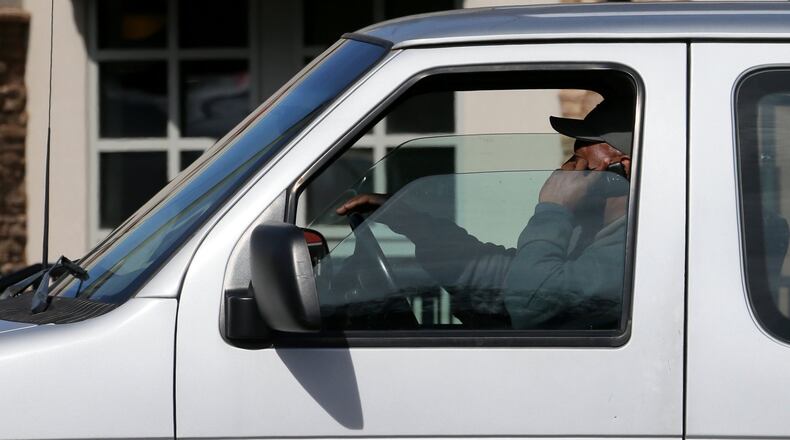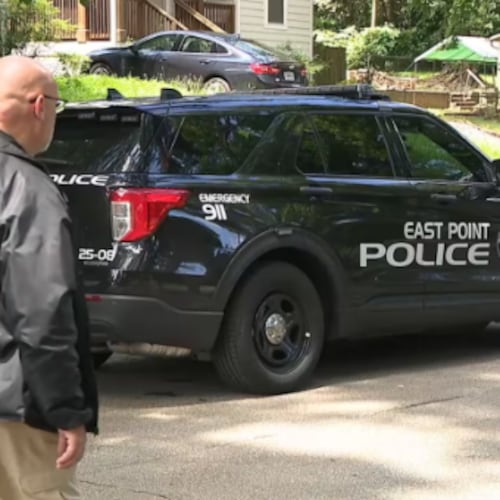Phones have gotten smart. Drivers? Not so much.
Our yearning to stay connected with the world at all times has made Georgia’s roads an increasingly dangerous place to be.
You already sensed it just driving around. People drive like birdbrains: A car blows blithely through a red light (a doctor on her phone once T-boned my family van), the driver ahead of you who just can’t stay in a lane, the SUV that lags behind others in the flow of traffic and then suddenly rushes to catch up.
Now, the numbers make clear that what we sensed is true.
Last year, 1,554 people died in motor vehicle accidents in Georgia, a 33 percent increase from 2014 when 1,170 were killed. Georgia's increase in deaths was more than twice the national increase during that time. In all, 40,200 people died in the U.S. last year, the first time it reached that level in a decade.
For years, highways had gotten safer, with better-designed cars, almost universal seat belt usage and alcohol-related deaths dropping to 10,000 a year, down from an average of 14,000 a decade earlier.
But what is almost certainly driving the increase in deaths is that many drivers have the attention span of a gnat because they are gawking at their phones.
Yes, we know that texting, Facebooking and checking email while driving qualifies you for a Darwin Award. In fact, 98 percent of respondents to a study commissioned by AT&T said exactly that. Still, 74 percent of those same respondents still did just that.
The disconnect is a familiar one. Generally, we think we’re smarter than the average bear.
“Motorists report that they use a cell phone because they harbor the belief they are personally capable of driving safely while doing so,” said a study from the University of Utah. “However, they also see other driver’s usage as much riskier than their own and consequently tend to support laws to restrict the behavior. That is, motorists want the laws to apply to the other driver.”
The National Highway Traffic Safety Administration says 3,500 people were killed because of distracted driving. But that number, almost everyone believes, is woefully low.
“That’s just the ones we can prove; it’s probably much higher,” said Harris Blackwood, director of the Georgia Governor’s Office of Highway Safety. “We have this 800-pound monster. We know it’s a problem but there’s no way to measure it.”
There are ways to measure how distracted driving played into fatal crashes. But it can be difficult. Skid marks can determine whether a driver was speeding. Investigators can draw blood from a corpse to measure alcohol. But what was going on in a driver’s mind in those last few moments of life is more difficult to determine.
Cops are getting better at cataloging such instances and are getting more aggressive about enforcing a 2010 law that outlawed texting behind the wheel.
"Last year, the state Department of Driver Services processed 3,866 citations for texting while driving and underage wireless use," my colleague David Wickert wrote last week. "That's up more than 30 percent from 2014."
A couple of years ago, Marietta officers posed as construction workers on the street to catch drivers texting. Marietta Police Chief Dan Flynn told me that cutting down on smartphone use while driving must go the same route as drunk driving once did — making it socially unacceptable.
“The mentality for drunk driving used to be, ‘There but for the grace of God go I,’” Flynn said. “But that whole scene changed.”
Still, he said, it’s hard to focus on writing such tickets when the public clamors for burglaries to get solved and drunks to get caught.
I asked how many distracted tickets his department writes these days. “Probably not as many as we should,” Flynn said.
The Georgia Legislature outlawed texting at the wheel in 2010, but technological advancements since then — and the ubiquity of smartphones — make the problems of seven years ago seem quaint.
State Rep. John Carson, a Marietta Republican, has introduced a resolution to create a study committee to try to figure out some way of dealing with it.
“This is something that must be addressed,” he said. “We have to do something.”
The comparison to drunk driving is an apt one because a 2004 study found that a motorist talking on a cellphone has the same impairment of a driver who is legally drunk — a blood-alcohol content of .08 percent.
But back then, the iPhone, which was released in 2007, was just a gleam in Steve Jobs’ eye.
If talking on a cellphone — it doesn’t matter if it’s hands-free or not — is like blowing a .08 BAC, then watching a video on YouTube or checking Facebook while driving is like smoking crack behind the wheel.
Studies show that people who constantly check incoming texts, tweets and Facebook messages do so for a little bump of dopamine in the brain. So if the phone buzzes, chirps or dings while driving, then the hand can’t resist reaching for it.
David Strayer, a professor of cognitive neuroscience at the University of Utah, has since 2000 been at the forefront of research into how cellphone use affects driving.
Years ago he wrote, “When a driver talks on a cellular phone, visual scanning is disrupted, prediction of hazards is impaired, identification of objects and events in the driving environment is retarded, decision for action is altered, and appropriate reactions are delayed.”
In an interview this week, he said:
“As alarmed as we were with cellphones, the use of smartphones and all the social media functions make those (previous) concerns pale in comparison. We are tracking a significant distraction with something that is worse.”
Please be safe out there. And keep your eyes on the road.
About the Author
Keep Reading
The Latest
Featured






